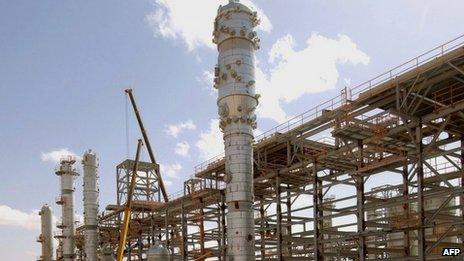Algeria siege: Hostage nations concerned over situation
- Published

Nations with hostages being held by militants at an Algerian gas plant have expressed concern at the ongoing siege.
US Secretary of State Hillary Clinton described the situation as "extremely difficult and dangerous".
While state media say hundreds of hostages have been freed at the remote In Amenas desert gas facility, about 30 foreigners are still unaccounted for.
State-run APS news agency says 12 Algerian and foreign workers have died since rescue efforts began on Thursday.
The operation to free hostages has now been going on for more than 36 hours, with few details being released by the Algerian authorities.
Norwegian firm Statoil announced on Saturday that two of its workers had been "brought to safety", leaving six more unaccounted for. It was not made clear how the pair had escaped the siege.
APS said that 573 Algerians and "around 100" of 132 foreign workers had been freed, and 18 militants had been killed.
The remaining militants - armed with missiles, rocket launchers, grenades, machine guns and assault rifles - are still holed up in a refinery at the site, which was surrounded by Algerian special forces, APS said.
About 10 Britons are thought to be still held.
The UN Security Council condemned the "heinous" hostage-taking, saying the incident underlined the need to bring its perpetrators, organisers and financiers to justice.
'Utmost care'
Mrs Clinton said Algerian Prime Minister Abdelmalek Sellal had told her on Friday that the "operation was still ongoing, that the situation remained fluid, that the hostages remain in danger in a number of instances".
She said she had urged the "utmost care" be taken in the protection of both Algerian and expatriate foreign hostages.
US officials earlier confirmed that there were still Americans being held at the site and re-iterated that the "United States does not negotiate with terrorists".
US Defence Secretary Leon Panetta told the BBC that no option was off the table when it came to ensuring that al-Qaeda and its associates did not establish a base in North Africa.
The US state department, meanwhile, confirmed an American hostage, Frederick Buttaccio, had died in the incident.
Two others, a Briton and an Algerian, reportedly died on Wednesday when the militants ambushed two buses that were taking foreign workers at the facility to the local airport.
After the attack on the buses, at 0500 local time on Wednesday, the militants drove to the installation and took Algerian and foreign workers hostage in the living area and the main gas facility at the complex.
At noon on Thursday, Algerian forces attacked as the militants tried to move some of their captives from the facility.
The current situation is unclear, but reports on Friday said security forces were still searching for the hostage-takers at the complex.
The installation had been put out of action to avoid the risk of an explosion, the state news agency reported.
Still in pursuit
Officials from several countries, including Japan, Norway, Ireland, the US and Austria have confirmed some of their nationals managed to escape.
Some freed British hostages told Algerian TV they were "relieved to be out"
One French citizen, Yann Desjeux, was killed in the military operation, said French Foreign Minister Laurent Fabius.
UK Prime Minister David Cameron told Parliament he had been told by Mr Sellal that it was a large site and troops were "still pursuing terrorists and possibly some of the hostages".
Algerian officials said the militants were operating under orders from Mokhtar Belmokhtar, who was a senior AQIM commander until late last year.
The Mauritanian ANI agency - which has received several messages from the militants - quoted sources from Belmokhtar's group as saying they wanted to exchange their American captives for two high-profile detainees in American jails.
They are the Egyptian Sheikh Omar Abdel-Rahman, convicted over the 1993 World Trade Center bombing in New York, and Pakistani scientist Aafia Siddiqui, who was convicted in 2010 of attempting to kill US military personnel.
An earlier statement purporting to come from the kidnappers says the raid was carried out in retaliation for the French intervention against Islamist groups, including al-Qaeda in the Islamic Maghreb (AQIM), in neighbouring Mali.
The In Amenas gas field is operated by the Algerian state oil company, Sonatrach, along with the British oil company BP and Norway's Statoil.
It is situated at Tigantourine, about 40km (25 miles) south-west of the town of In Amenas and 1,300km (800 miles) south-east of Algiers.
BP said hundreds of workers from international oil companies had been evacuated from Algeria on Thursday and that many more would follow.
- Bus attack: 0500 local time 16 January: Heavily armed gunmen attack two buses carrying gas field workers towards In Amenas airfield. A Briton and an Algerian die in the fighting.
- Hostages taken: The militants drive to the installation at Tigantourine and take Algerian and foreign workers hostage in the living area and the main gas facility at the complex.
- Army surround complex: Security forces and the Algerian army surround the hostage-takers. Western leaders, including the UK's David Cameron, urge Algeria to consult them before taking action.
- Army attacks: 1200 (1300 GMT) 17 January: Algerian forces attack as militants try to move some of their captives from the facility. Reports say some hostages escape, but others are killed.
- Response: The Algerians say they are still pursuing the militants in an operation that now lasted more than 36 hours.